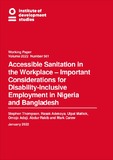Accessible Sanitation in the Workplace – Important Considerations for Disability-Inclusive Employment in Nigeria and Bangladesh
| dc.contributor.author | Thompson, Stephen | |
| dc.contributor.author | Adekoya, Rasak | |
| dc.contributor.author | Mallick, Utpal | |
| dc.contributor.author | Adaji, Omojo | |
| dc.contributor.author | Rakib, Abdur | |
| dc.contributor.author | Carew, Mark | |
| dc.coverage.spatial | Nigeria | en |
| dc.coverage.spatial | Bangladesh | en |
| dc.date.accessioned | 2022-01-27T11:51:04Z | |
| dc.date.available | 2022-01-27T11:51:04Z | |
| dc.date.issued | 2022-01-27 | |
| dc.identifier.citation | Thompson, S.; Adekoya, R.; Mallick, U.; Adaji, O.; Rakib, A. and Carew, M. (2022) Accessible Sanitation in the Workplace – Important Considerations for Disability-Inclusive Employment in Nigeria and Bangladesh, IDS Working Paper 561, Brighton: Institute of Development Studies, DOI: 10.19088/IDS.2022.003 | en |
| dc.identifier.isbn | 978-1-78118-912-2 | |
| dc.identifier.issn | 2040-0209 | |
| dc.identifier.uri | https://opendocs.ids.ac.uk/opendocs/handle/20.500.12413/17082 | |
| dc.description.abstract | This paper explores the relationship between accessible sanitation and disability-inclusive employment in Bangladesh and Nigeria. Both countries have sanitation and hygiene challenges as well as disability-inclusive employment challenges, but the existing evidence on the intersection of these issues that is focused on Nigeria and Bangladesh is extremely limited. Building on the literature where this complex issue is addressed, this paper presents the findings of a qualitative pilot study undertaken in Nigeria and Bangladesh. It focuses on the need for toilets at work that are easy for people with disabilities to use in poor countries. These are sometimes called accessible toilets. Accessible sanitation is not regarded as a challenge that must be addressed by people with disabilities themselves, but as a challenge that must be addressed by many people working together – including governments, employers, and the community. | en |
| dc.description.sponsorship | Swedish International Development Cooperation Agency | en |
| dc.language.iso | en | en |
| dc.publisher | Institute of Development Studies | en |
| dc.relation.ispartofseries | IDS Working Paper;561 | |
| dc.rights | This is an Open Access paper distributed under the terms of the Creative Commons Attribution Non Commercial No Derivatives 4.0 International licence (CC BY-NC-ND), which permits use and distribution in any medium, provided the original authors and source are credited, the work is not used for commercial purposes, and no modifications or adaptations are made. | en |
| dc.rights.uri | http://creativecommons.org/licenses/by-nc-nd/4.0/ | en |
| dc.subject | Rights | en |
| dc.subject | Water | en |
| dc.subject | Work and Labour | en |
| dc.title | Accessible Sanitation in the Workplace – Important Considerations for Disability-Inclusive Employment in Nigeria and Bangladesh | en |
| dc.type | IDS Working Paper | en |
| dc.rights.holder | Institute of Development Studies | en |
| dc.identifier.team | Participation Power and Social Change | en |
| dc.identifier.doi | 10.19088/IDS.2022.003 | |
| dcterms.dateAccepted | 2022-01-27 | |
| rioxxterms.funder | Default funder | en |
| rioxxterms.identifier.project | Default project | en |
| rioxxterms.version | VoR | en |
| rioxxterms.versionofrecord | 10.19088/IDS.2022.003 | en |
| rioxxterms.funder.project | 9ce4e4dc-26e9-4d78-96e9-15e4dcac0642 | en |
Files in this item
This item appears in the following Collection(s)
-
Disability Inclusion – IDS Collection [74]
-
The Sanitation Learning Hub [133]
-
IDS Research [1668]
Except where otherwise noted, this item's license is described as This is an Open Access paper distributed under the terms of the Creative Commons Attribution Non Commercial No Derivatives 4.0 International licence (CC BY-NC-ND), which permits use and distribution in any medium, provided the original authors and source are credited, the work is not used for commercial purposes, and no modifications or adaptations are made.


